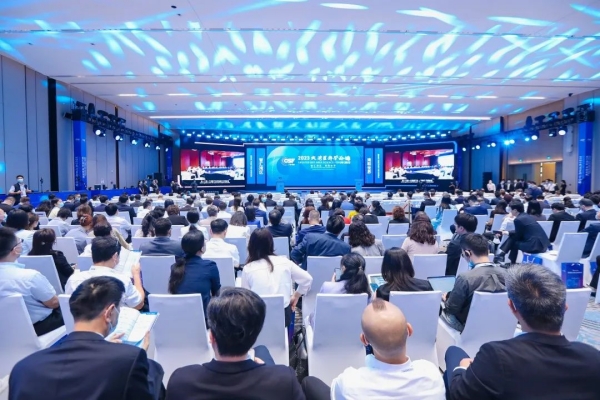2023 Greater Bay Area Science Forum held in Guangzhou

A photo taken on May 21 shows attendees at the opening ceremony of the 2023 Greater Bay Area Science Forum in Guangzhou, capital city of South China's Guangdong province. [Photo/gsf.org.cn]
The 2023 Greater Bay Area Science Forum (GSF) opened in Guangzhou, capital city of South China's Guangdong province, on May 21.
Launched by the Alliance of International Science Organizations under the guidance of the Ministry of Science and Technology, the Chinese Academy of Sciences (CAS), the Chinese Academy of Engineering (CAE), the China Association for Science and Technology (CAST) and the Guangdong Provincial People's Government, the 2023 GSF aimed to comprehensively implement the guiding principles of the 20th National Congress of the Communist Party of China (CPC), as well as important discourses and instructions made by General Secretary of the CPC Central Committee Xi Jinping, also Chinese president, in a inspection tour of Guangdong in April.
Themed "Bring together wisdom, bring together the world", the four-day forum drew nearly 100 academicians and leading experts from China and beyond in person or video link. They held in-depth talks on marine science, nanoscience, high-energy physics, advanced manufacturing, artificial intelligence and other frontier topics in a drive to promote exchanges and mutual learning in global sci-tech innovation in the Guangdong-Hong Kong-Macao Greater Bay Area.
Leung Chun-Ying, vice-chairman of the 14th National Committee of the Chinese People's Political Consultative Conference (CPPCC), delivered a speech at the opening ceremony. He said that potential cooperation in science and technology within the Greater Bay Area will be unparalleled in other urban agglomerations since as the area is a gathering place for high-end talents both domestically and internationally. Leung added that it is of great importance for the further development of sci-tech innovations in the Great Bay Area to make full use of such resources of the Hong Kong Special Administrative Region (SAR) as its international financial services, international trade services, and international intellectual property protection and trading services.
Wan Gang, chairman of the China Association for Science and Technology (CAST), said that as a platform featuring joint consultation, building and sharing, the GSF shall target global frontier technologies and common issues, forge new consensus for international cooperation, create new cooperative mechanisms, and write a bright future through concerted efforts. He added that the CAST will fully leverage its unique organizational strengths and talents in gathering global talents, promoting sci-tech innovation and science popularization, and providing strategic counseling services. It will also seek to help Chinese scientists better integrate into the global network of innovation, and pool the strength of the sci-tech sector worldwide to build a community with a shared future for mankind.
In his speech at the ceremony via video link, John Lee Ka-chiu, Hong Kong SAR's chief executive, said that the SAR has done its utmost to get involved in national development strategies and has always placed sci-tech innovations high on its agenda. He also noted that cities in the GBA have different advantages and can further strengthen collaborative innovation and the development of industry, academia and research. He stressed that Hong Kong will reinforce its compatibility with other GBA cities, meet the demand of key national development strategies, and contribute to helping the country further enhance its sci-tech strength.
Macao Chief Executive Ho Iat-seng said that the SAR will give full play to the "one country, two systems" principle, closely position itself in the building of a world-class tourism & leisure centre, and perform its role as a commerce and trade cooperation service platform between China and Lusophone countries. The region will also act as a base for exchanges and cooperation, in which Chinese culture is the mainstream and diverse cultures coexist. It will proactively participate in the construction of the Greater Bay Area science and technology innovation corridor, strengthen the coordinated development of key industries within the area, support platform building for sci-tech cooperation, achieve the smooth flow of sci-tech elements, and build the region into a global sci-tech innovation highland.
Wang Weizhong, deputy Party secretary and governor of Guangdong, said that over the past several years, the province has worked closely with Hong Kong and Macao to promote the building of an international innovation & technology hub and a comprehensive national science center, facilitate the connectivity between innovative elements within the Greater Bay Area, continuously bolster the region's innovative strength and achieve the vibrant development of innovative industries. He emphasized that the southern province will thoroughly implement the innovation-driven development strategy, build a whole-process innovation chain, and further strengthen its innovative and integrated development and resource sharing with the two SARs.
Noting that the year 2023 marks the 10th anniversary of the China-proposed Belt and Road Initiative (BRI), Bai Chunli, an academician with the Chinese Academy of Sciences (CAS), said that the CAS has established a BRI-related innovation development counseling program, and has published a report on sci-tech innovation and cooperation under the framework of the high-quality development of the BRI, further gathering the strength of the sci-tech sector in the implementation of the BRI.
The ceremony also witnessed the inauguration of a foundation on scientific research with 3 billion yuan ($430 million) donated by He Xiangjian, founder of Chinese home appliances manufacturer Midea Group.
Those in attendance included Huang Kunming, a member of the Political Bureau of the CPC Central Committee and Party secretary of Guangdong; Huang Xiaowei, secretary of the Leading Party Members' Group and vice-president and first member of the Secretariat of the All-China Women's Federation (ACWF); Chinese-American Nobel laureate Samuel C. C. Ting; Michael Levitt, Nobel laureate in Chemistry and a professor with Stanford University.












